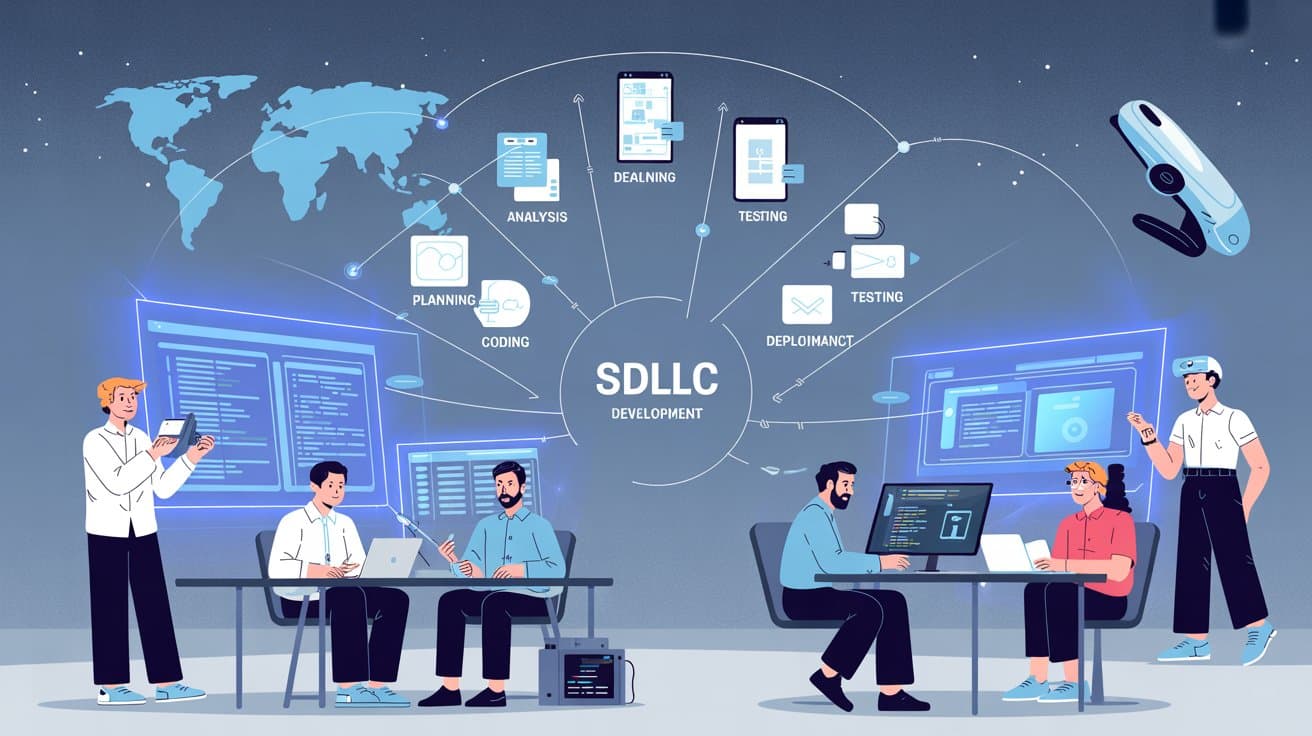
How a Software Development Firm in India Develops Products: Methods, Benefits, and Future Prospects
India has emerged as a global hub for software development, offering companies across the world high-quality, cost-effective, and innovative digital solutions. Software development firms in India specialize in turning ideas into scalable, secure, and market-ready products for businesses of all sizes, from startups to large enterprises.
This article explores how Indian software development companies develop products, the methods and methodologies they use, the benefits of partnering with them, and the future prospects of software development in India.
Understanding Software Development in India
Software development is a structured process that involves planning, designing, coding, testing, deploying, and maintaining software applications. Indian software firms have leveraged decades of technical expertise, a large talent pool, and cost-effective solutions to build products for clients worldwide.
A software product can range from:
- Web applications: Platforms, portals, e-commerce websites
- Mobile apps: Android, iOS, and cross-platform apps
- Enterprise software: ERP, CRM, and business automation tools
- Custom solutions: Tailored software for industry-specific challenges
Indian software firms provide end-to-end solutions, including ideation, design, development, quality assurance, deployment, and post-launch support.
Methods and Methodologies in Product Development
Software development firms in India follow proven methodologies to ensure high-quality delivery and client satisfaction. The most common methodologies include:
-
Waterfall Methodology
Waterfall is a linear and sequential approach to software development. Each phase must be completed before moving to the next.
Phases include:
- Requirement Analysis
- System Design
- Implementation (Coding)
- Testing
- Deployment
- Maintenance
Benefits of Waterfall:
- Structured and easy to manage
- Clear milestones and deliverables
- Suitable for projects with fixed requirements
Limitations:
- Less flexibility for changes
- Late discovery of issues
-
Agile Methodology
Agile is a flexible, iterative approach that allows teams to adapt to changing requirements and deliver software in incremental sprints.
Key Features:
- Short development cycles (sprints)
- Continuous feedback from clients
- Regular updates and iterations
- Close collaboration between developers, clients, and stakeholders
Benefits of Agile:
- Faster delivery of working software
- Improved client engagement
- Ability to adapt to changing business needs
- Early identification of bugs or issues
-
DevOps Approach
DevOps integrates development and operations, focusing on automation, continuous integration (CI), and continuous delivery (CD).
Key Features:
- Automated build, test, and deployment pipelines
- Continuous monitoring of applications
- Collaboration between development and operations teams
Benefits of DevOps:
- Faster time-to-market
- Reduced production failures
- Improved system reliability and scalability
-
Lean Software Development
Lean methodology emphasizes eliminating waste, optimizing processes, and delivering maximum value to the client.
Principles of Lean:
- Focus on value-added tasks
- Reduce unnecessary processes
- Continuous improvement
Benefits:
- Cost-efficient development
- Reduced project timelines
- High-quality output
-
Hybrid Approaches
Many Indian software firms adopt hybrid models, combining Agile, DevOps, and Waterfall practices to fit the unique needs of the client and project. This ensures maximum flexibility and reliability.
Step-by-Step Software Product Development Process
Indian software development companies follow a structured product development process to ensure consistency, quality, and timely delivery.
Step 1: Ideation and Conceptualization
This phase involves understanding the client’s vision, target audience, and business objectives.
Activities:
- Brainstorming sessions with clients
- Market research and competitor analysis
- Feasibility study and technical assessment
- Defining project scope, objectives, and deliverables
Benefits:
- Clear roadmap for development
- Avoids scope creep
- Helps align the product with business goals
Step 2: Requirement Gathering and Analysis
The development team collects detailed requirements to create a product specification document.
Activities:
- Conducting client interviews
- Gathering user stories and use cases
- Prioritizing features based on importance
- Documenting functional and non-functional requirements
Benefits:
- Clear understanding of expectations
- Reduces miscommunication
- Forms a solid foundation for design and development
Step 3: Designing the Product
Design is a critical phase where the software’s architecture, UI, and UX are created.
Activities:
- System architecture planning
- Wireframing and mockups for UI/UX
- Database design
- Selecting technology stack (Java, Python, .NET, Angular, React, etc.)
Benefits:
- Scalable and maintainable architecture
- Intuitive user experience
- Visual representation for client approval
Step 4: Development (Coding)
This is the core phase where developers write the actual code based on the design document.
Activities:
- Frontend and backend development
- API development and integration
- Version control and code management
- Unit testing during development
Benefits:
- Creation of functional software
- High-quality, modular code
- Ready for testing and deployment
Step 5: Testing and Quality Assurance
Testing ensures the software is bug-free, secure, and meets requirements.
Types of Testing:
- Unit Testing
- Integration Testing
- System Testing
- User Acceptance Testing (UAT)
- Security and performance testing
Benefits:
- Reliable and secure software
- Reduced post-deployment issues
- Enhanced user satisfaction
Step 6: Deployment
The software is released to production and made available to users.
Activities:
- Deployment planning
- Data migration
- Configuration management
- Monitoring initial usage and performance
Benefits:
- Smooth transition to live environment
- Immediate user access
- Operational efficiency
Step 7: Maintenance and Updates
Maintenance ensures the software continues to perform optimally over time.
Activities:
- Bug fixes and patches
- Adding new features or enhancements
- Updating security protocols
- Performance optimization
Benefits:
- Prolonged software life
- Keeps software relevant with evolving needs
- Continuous improvement for user satisfaction
Key Technologies Used by Software Development Firms in India
Indian firms leverage modern tools and technologies to deliver innovative solutions:
- Frontend Development: HTML5, CSS3, Angular, React, Vue.js
- Backend Development: Java, Python, .NET, Node.js, PHP
- Database Technologies: MySQL, PostgreSQL, MongoDB
- Mobile App Development: Android, iOS, Flutter, React Native
- Cloud Platforms: AWS, Azure, Google Cloud
- DevOps Tools: Jenkins, Docker, Kubernetes, CI/CD pipelines
- Testing & QA Tools: Selenium, JIRA, LoadRunner
Benefits of Choosing a Software Development Firm in India
Partnering with a top software development company India or a custom software development company in India offers numerous advantages that help businesses achieve innovation, scalability, and global competitiveness.
1. Cost-Effective Solutions
- Affordable development rates without compromising quality, making it ideal for startups and enterprises alike
- Lower operational and project costs compared to Western countries, positioning India among the best software development companies
2. Access to Skilled Talent
- Large pool of certified developers and experienced professionals
- Expertise across multiple platforms and technologies, making Indian firms some of the famous software developers in India
3. High-Quality Development
- Strong focus on code quality, rigorous testing, and high-performance software
- Adoption of industry-standard practices like Agile, DevOps, and Lean ensures consistent and reliable delivery
4. Time Zone Advantage
- Flexible working hours to align with client time zones, ensuring seamless communication
- Faster response time and project updates for clients worldwide
5. Innovation and Creativity
- Expertise in AI, ML, IoT, cloud-based solutions, and emerging technologies
- Ability to create market-ready, cutting-edge software products that set you apart in the digital space
6. Scalability and Flexibility
- Easily scale development teams up or down based on project requirements
- Adaptable to changing business needs, providing a competitive edge
7. Long-Term Partnership
- Focus on building long-term client relationships rather than one-time projects
- Post-launch support and continuous improvement make them a trusted choice in the top 10 software development company India
By choosing a software development company India list leader or one of the top 100 software development companies in India, businesses can ensure high-quality, reliable, and scalable software solutions that drive growth and innovation.
Future Benefits of Software Development in India
The future of software development in India looks promising, with increasing adoption of emerging technologies:
- Artificial Intelligence and Machine Learning
- Integration of AI/ML in software products for predictive analytics, automation, and personalization
- Smarter applications with advanced data processing
- Cloud Computing
- Cloud-native applications for scalability and reduced infrastructure costs
- Increased adoption of SaaS and PaaS models
- IoT and Connected Devices
- Development of smart devices and IoT applications
- Real-time monitoring and control solutions
- Blockchain and Cybersecurity
- Blockchain-based secure software solutions
- Focus on data privacy and protection
- Global Market Expansion
- Indian firms continue to provide offshore services to the US, Europe, and Middle East
- Increasing recognition for high-quality, reliable software solutions
- Agile and DevOps Adoption
- Faster delivery cycles and continuous improvement
- Reduced time-to-market for innovative products
- Automation and Low-Code Platforms
- Rapid development with minimal manual coding
- Reduced errors and faster prototyping
Software development firms in India combine technical expertise, cost-effectiveness, and client-focused processes to deliver products that meet global standards. By following structured methodologies, leveraging modern technologies, and providing end-to-end services—from ideation to maintenance—Indian firms enable businesses to innovate, scale, and succeed in the digital era.
With the adoption of AI, cloud computing, IoT, and blockchain, software development in India is set to offer more sophisticated, efficient, and secure solutions for businesses worldwide. Choosing the right Indian software partner ensures reliability, innovation, and long-term success for any digital product.
Conclusion
Indian software development companies have earned a global reputation as famous software developers in India. By leveraging advanced technologies, structured development processes, and proven methodologies, they deliver high-quality, cost-effective, and scalable software solutions.
Whether you are searching for a custom software development company in India, exploring the software development company India list, or looking to hire from the top software development company India, India provides a reliable, innovative, and future-ready software development ecosystem.
Choosing the best software development company ensures long-term growth, seamless product development, and global competitiveness for your business.
Connect with EiBS today to transform your ideas into scalable software solutions and accelerate your business success.


